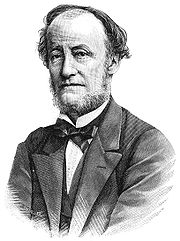
John Lemoinne
Encyclopedia

France
The French Republic , The French Republic , The French Republic , (commonly known as France , is a unitary semi-presidential republic in Western Europe with several overseas territories and islands located on other continents and in the Indian, Pacific, and Atlantic oceans. Metropolitan France...
journalist
Journalist
A journalist collects and distributes news and other information. A journalist's work is referred to as journalism.A reporter is a type of journalist who researchs, writes, and reports on information to be presented in mass media, including print media , electronic media , and digital media A...
.
Early years
Lemoinne was born of French parents in LondonLondon
London is the capital city of :England and the :United Kingdom, the largest metropolitan area in the United Kingdom, and the largest urban zone in the European Union by most measures. Located on the River Thames, London has been a major settlement for two millennia, its history going back to its...
. He was educated first at an English school and then in France. In 1840 he began writing for the Journal des débats, on English and other foreign questions, and under the empire
Second French Empire
The Second French Empire or French Empire was the Imperial Bonapartist regime of Napoleon III from 1852 to 1870, between the Second Republic and the Third Republic, in France.-Rule of Napoleon III:...
he held up to admiration the free institutions of England by contrast with imperial methods. After 1871 he supported Thiers
Adolphe Thiers
Marie Joseph Louis Adolphe Thiers was a French politician and historian. was a prime minister under King Louis-Philippe of France. Following the overthrow of the Second Empire he again came to prominence as the French leader who suppressed the revolutionary Paris Commune of 1871...
, but his sympathies rather tended towards a liberalized monarchy, until the comte de Chambord's policy made such a development an impossibility, and he then ranged himself with the moderate republicans
Republicanism
Republicanism is the ideology of governing a nation as a republic, where the head of state is appointed by means other than heredity, often elections. The exact meaning of republicanism varies depending on the cultural and historical context...
.
Career
In 1875 Lemoinne was elected to the French AcademyAcadémie française
L'Académie française , also called the French Academy, is the pre-eminent French learned body on matters pertaining to the French language. The Académie was officially established in 1635 by Cardinal Richelieu, the chief minister to King Louis XIII. Suppressed in 1793 during the French Revolution,...
, and in 1880 he was nominated a life senator
Senator for life
A senator for life is a member of the senate or equivalent upper chamber of a legislature who has life tenure. , 7 Italian Senators out of 322, 4 out of the 47 Burundian Senators and all members of the British House of Lords have lifetime tenure...
. Distinguished though he was for a real knowledge of England among the French journalists who wrote on foreign affairs, his tone towards English policy greatly changed in later days, and though he never shared the extreme French bitterness against England as regards Egypt
Egypt
Egypt , officially the Arab Republic of Egypt, Arabic: , is a country mainly in North Africa, with the Sinai Peninsula forming a land bridge in Southwest Asia. Egypt is thus a transcontinental country, and a major power in Africa, the Mediterranean Basin, the Middle East and the Muslim world...
, he maintained a critical attitude which served to stimulate French Anglophobia
Anglophobia
Anglophobia means hatred or fear of England or the English people. The term is sometimes used more loosely for general Anti-British sentiment...
. He was a frequent contributor to the Revue des deux mondes
Revue des deux mondes
The Revue des deux Mondes is a French language monthly literary and cultural affairs magazine that has been published in Paris since 1829....
, and published several books, the best known of which is his Études critiques et biographiques (1862).
Works
- Les Élections en Angleterre, lettres publiées dans le "Journal des débats". Paris: J. Hetzel, 1841
- Les Anglais dans le Caboul. Paris: au bureau de la Revue des deux mondes, 1842
- Affaires de Rome. Paris: E. Blanchard, 1850
- Letters of John Lemoinne [on the Exhibition held in London in 1851]. In: Lardner (D.) The Great Exhibition, etc. 1852
- Études critiques et biographiques: Études critiques: Shakspeare, l'abbé Prévost, Goethe ...; Études biographiques: Brummel, O'Connel, Robert Peel, Haydon, Chateaubriand.... Paris, 1852
- De l'intégrité de l'empire ottoman. Paris: M. Lévy frères, 1853
- Le Passage du Nord. Strasbourg: Treuttel et Würtz, 1854
- Nouvelles études critiques et biographiques. Paris: Michel Lévy frères, 1863
- Histoire de Manon Lescaut et du chevalier DesGrieux par l’abbé Prévost. Nouv. éd. précédée d’une étude par John Lemoinne. Paris: Levy, 1900

